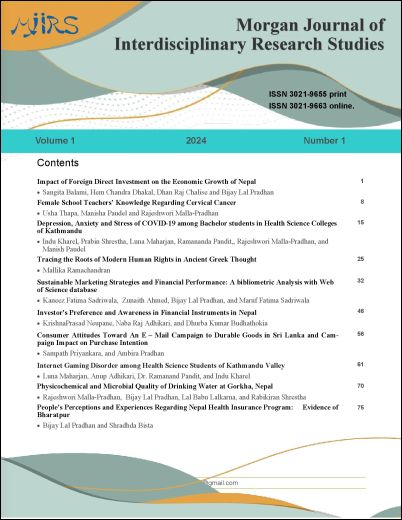
Internet Gaming Disorder among Health Science Students of Kathmandu Valley | Morgan Journal of Interdisciplinary Research Studies
Internet gaming disorder is characterized by persistent, unchecked gaming to the point where it interferes with other hobbies, everyday activities, and has harmful effects. Internet gaming is more common among younger people. This study aims to investigate the prevalence of risk of developing gaming disorder, and its related risk factors among health science students of Kathmandu, Nepal. A total of 422 public health students from Purbanchal University in Kathmandu filled out a Google form that was distributed by lecturers and representatives via email, Viber, and Messenger between January to March 2021. Data were gathered with administrative approval and individual agreement, and SPSS version 25 was used for analysis. The study indicated that the majority of students (84.8%) had a normal risk of acquiring internet gaming disorder, but a considerable minority (15.2%) were at risk. Although the majority of respondents who played games had appropriate gaming behaviour, a significant percentage of them were in danger. The finding showed a relationship between internet gaming disorder and variables including gender, semester, internet use, game features, game hours, and game money spent. Video games are widespread in current culture, yet a large minority suffers harmful consequences so policymakers are advised to create regulations that promote healthy gaming habits, such as prohibiting minor players and limiting access to online games at particular times.
- Maharjan, L., Adhikari, A., Pandit, R., & Kharel, I. (2024). Internet Gaming Disorder among Health Science Students of Kathmandu Valley. Morgan Journal of Interdisciplinary Research Studies, 1(1), 61–69. https://doi.org/10.3126/mjirs.v1i1.63317
要旨
インターネットゲーム障害とは、他の趣味や日常生活に支障をきたし、有害な影響を及ぼすほど、執拗で抑制のきかないゲームによって特徴づけられる。インターネットゲームは若年層に多くみられる。本研究の目的は、ネパール・カトマンズの保健科学生を対象に、ゲーム障害発症リスクの有病率とその関連危険因子を調査することである。2021年1月から3月にかけて、カトマンズにあるプルバンチャル大学の公衆衛生学の学生計422人が、講師や代表者から電子メール、Viber、Messengerで配布されたGoogleフォームに記入した。データは管理者の承認と個人の同意を得て収集され、分析にはSPSSバージョン25が使用された。調査の結果、インターネットゲーム障害になるリスクは、過半数の学生(84.8%)が「普通」であったが、かなりの少数派(15.2%)が「リスクあり」であった。ゲームをしている回答者の大多数は適切なゲーム行動をしていたが、かなりの割合で危険な状態にあった。インターネットゲーム障害と、性別、学期、インターネット利用、ゲームの特徴、ゲーム時間、ゲームに費やしたお金などの変数との関係が示された。ビデオゲームは現在の文化に広く浸透しているが、有害な結果を被る人は少数派であるため、政策立案者は、未成年者のプレイを禁止したり、特定の時間帯にオンラインゲームにアクセスすることを制限するなど、健全なゲーム習慣を促進する規制を設けることが勧められる。
